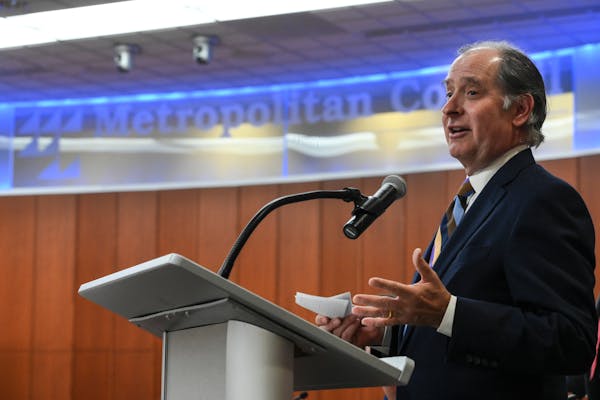Though serious crime aboard Metro Transit buses and light rail trains surged by nearly two-thirds in the first quarter of 2023, the agency's new police chief said Wednesday he's confident a plan to combat crime will produce results.
Sworn in as Metro Transit's police chief in March, Ernest Morales III joined the department as a 40-point action plan was being implemented to bolster an official presence on public transit. That strategy, adopted last year, includes more police and community service officers on light-rail trains, private security guards at problem stations, and a beefed-up emphasis on fare compliance.
"We want to take the system back for our customers," Morales said Wednesday during a Metropolitan Council meeting.
The need to combat crime has become especially acute as ridership slowly recovers following the COVID-19 pandemic. According to Metro Transit, the crime increase is largely driven by drug use and drug-equipment violations, which accounted for 38% of serious crimes on public transit.
Fentanyl is "a societal problem," said Council Member Judy Johnson, who represents the northwestern suburbs. "We have an epidemic — I would say a pandemic — of fentanyl abuse. It's an uphill battle."
The top category for serious crimes continues to be property damage. Overall crime increased by 66% in this year's first quarter.
Some of Metro Transit's crime-fighting efforts await action at the Legislature, where the transportation omnibus bill calls for a new team called the Transit Service Intervention Project. Over a three-month period this summer, team members would provide mental health, alcohol and chemical dependency outreach services for Green and Blue Line passengers, as well as housing and shelter alternatives for riders who are homeless.
Morales, who has spent considerable time aboard trains and buses over the past two months, said Metro Transit is "a major transportation system that has become an unofficial homeless shelter." Because there are no turnstiles to discourage fare evaders, he said, "we've seen a flood of chemically dependent people."
The Legislature is also contemplating a change in the way fare evasion is prosecuted, which rarely happens. Now a misdemeanor with a $180 fine, legislation could result in scofflaws getting an administrative citation akin to a parking ticket.
But Morales said those who commit more serious crimes should be prosecuted: "We must hold people accountable for their behavior."
Prospective legislative action would also enable "transit representatives" to order people off trains and buses if they're violating Metro Transit's code of conduct.
While the Met Council hopes to hire up to 70 community service officers (CSOs) — cadets enrolled in law enforcement programs — Interim General Manager Lesley Kandaras said Metro Transit may also hire employees outside the police department to help with fare inspections and serve as the system's "eyes and ears."
Hiring more police officers remains a challenge for Metro Transit. While the council has budgeted for 171 full-time officers, only 110 currently report for duty. Only 45 part-time officers are working, even though the department has budgeted for 80. Just 15 CSOs so far have been hired. Morales said departments throughout the metro are experiencing a similar dearth of officers.
Metro Transit has broadened a pilot program to use security guards at troublesome stations, including Lake Street/Midtown and Franklin Avenue on the Blue Line; St. Paul's Central station on the Green Line; the Brooklyn Center Transit Center, and the Uptown and Chicago-Lake stations in Minneapolis.
As Met Council Member Deb Barber, who represents the southwestern suburbs, put it: "You can't fix anything if you're not admitting there's a problem."

Want to share info with the Star Tribune? How to do it securely

'Safe recovery sites' would offer syringes, naloxone and more to people using drugs. The plan could be in peril.
New Minnesota GOP leaders seek peace with party's anti-establishment wing

Who is Republican Lisa Demuth, Minnesota's first House speaker of color?

